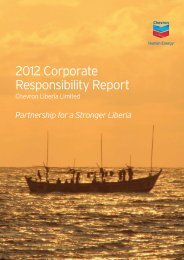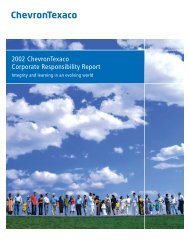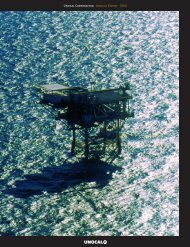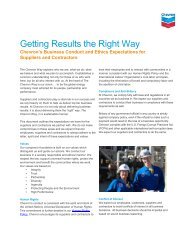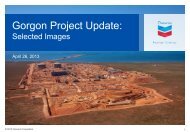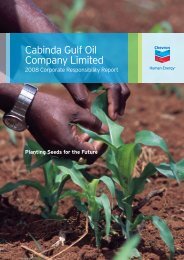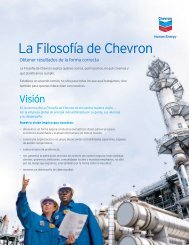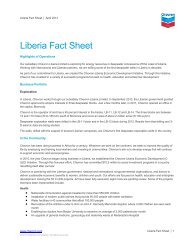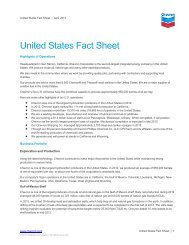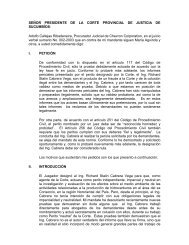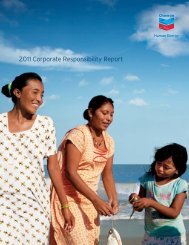Download PDF - Chevron
Download PDF - Chevron
Download PDF - Chevron
Create successful ePaper yourself
Turn your PDF publications into a flip-book with our unique Google optimized e-Paper software.
UPSTREAM<br />
Asia-Pacific<br />
Development The Karachaganak Field is being developed<br />
in phases. Phase 2, which included construction<br />
of natural gas injection and liquids-processing facilities<br />
and an increase in liquids export capability via<br />
the CPC pipeline, was completed in the third quarter<br />
2004. Before the Phase 2 development, production from<br />
Karachaganak was processed in Orenburg, Russia.<br />
In the fourth quarter 2004, the Phase 2 liquids processing<br />
capabilities and CPC pipeline access allowed<br />
daily production of approximately 219,000 barrels of<br />
liquids (41,000 net barrels) and 750 million cubic feet<br />
of natural gas (140 million net cubic feet). In addition,<br />
the project achieved a daily natural gas injection rate<br />
of 442 million cubic feet. Access to the CPC pipeline<br />
accommodates sales of approximately 150,000 barrels<br />
per day of processed liquids (28,000 net barrels) to<br />
world markets. The remaining liquids are still sold into<br />
the Russian market. The first CPC pipeline loading of<br />
Karachaganak liquids out of Novorossiysk took place<br />
in June 2004. Proved developed reserves associated<br />
with Phase 2 have been added over the 2002 to 2004<br />
time period. The Karachaganak operations are conducted<br />
under a 40-year concession agreement that expires in 2038.<br />
The next phase of development, Phase 3, was<br />
under evaluation in early 2005. This project presents an<br />
opportunity to produce larger volumes of raw natural<br />
gas and further extend the duration of the liquids plateau<br />
rate. The third development phase would be linked<br />
to the construction of a natural gas processing facility<br />
by a third party to enable export of processed gas.<br />
Construction of this facility is outside the terms of the<br />
Karachaganak production-sharing agreement and is<br />
dependent upon achieving an acceptable gas sales price<br />
to support the expansion. Timing for the recognition<br />
of Phase 3 reserves and an increase in production are<br />
uncertain and depend on achieving a gas sales agreement.<br />
Tengizchevroil<br />
<strong>Chevron</strong>Texaco holds a 50 percent interest in TCO,<br />
which is developing the giant Tengiz and Korolev crude<br />
oil fields, located in western Kazakhstan, under a 40-year<br />
concession that expires in 2033.<br />
Production Average 2004 total daily production was<br />
298,000 barrels of crude oil (131,000 net barrels), 453<br />
million cubic feet of natural gas (208 million net cubic<br />
feet) and 27,000 barrels of natural gas liquids (12,000<br />
net barrels). The 2004 production levels represent a<br />
7 percent increase over 2003 production levels on a<br />
total oil-equivalent basis.<br />
Development TCO is undertaking a significant expansion<br />
composed of two integrated projects referred to<br />
as Second Generation Project (SGP) and Sour Gas<br />
Injection (SGI). At a total estimated cost in excess of<br />
$4 billion, these projects are designed to increase TCO’s<br />
total daily crude oil production capacity from 298,000<br />
barrels to between 430,000 and 500,000 barrels by late<br />
2006, depending on the final effects of SGI.<br />
SGP involves the construction of a large processing<br />
train for treating crude oil and the associated sour<br />
gas. The SGP design is based on the same conventional<br />
technology employed in the existing processing trains.<br />
In addition to new processing capacity, SGP involves<br />
drilling and/or completion of 55 production wells in<br />
the Tengiz and Korolev reservoirs to generate the volumes<br />
for the new processing train. Proved undeveloped<br />
reserves associated with SGP were recognized in 2001.<br />
Some of these reserves were reclassified to proved<br />
developed in 2004 based upon completion of certain<br />
project milestones. Over the next decade, ongoing field<br />
development is expected to result in the maturation<br />
of the current proved undeveloped reserves to proved<br />
developed.<br />
SGI involves taking a portion of the rich, sour<br />
gas separated from the crude oil production at the<br />
SGP processing train and reinjecting it into the Tengiz<br />
and Korolev reservoirs. <strong>Chevron</strong>Texaco expects that<br />
SGI will have two key effects. First, SGI is expected to<br />
reduce the requirement for sour gas processing capacity<br />
at SGP, thereby increasing liquid production capacity<br />
and lowering the quantities of sulfur and gas that would<br />
otherwise be generated. Second, over time it is expected<br />
that SGI will increase production efficiency and increase<br />
recoverable volumes because of the maintaining of higher<br />
reservoir pressure from the gas reinjection. Between<br />
2006 and 2008, the company anticipates recognizing<br />
additional proved reserves associated with the SGI<br />
expansion. The primary SGI risks include uncertainties<br />
about compressor performance associated with injecting<br />
high-pressure sour gas and subsurface response to<br />
injection.<br />
Essentially all of TCO’s production is exported<br />
through the CPC pipeline that runs from Tengiz in<br />
Kazakhstan to tanker-loading facilities at Novorossiysk<br />
on the Russian coast of the Black Sea. The CPC<br />
pipeline, which is expected to be expanded in stages<br />
through the end of 2008, is anticipated to fully accommodate<br />
TCO expansion volumes by the end of 2007. In<br />
early 2005, TCO was pursuing alternate transportation<br />
routes to accommodate expansion volumes prior to the<br />
end of 2007 as necessary.<br />
KUWAIT<br />
<strong>Chevron</strong>Texaco has a Technical Service Agreement<br />
(TSA) with Kuwait Oil Company (KOC). This agreement,<br />
first established in 1994, was renewed again in<br />
early 2005. <strong>Chevron</strong>Texaco seconded technical and<br />
26



